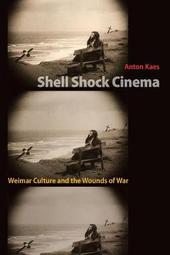
|
Shell Shock Cinema: Weimar Culture and the Wounds of War
Paperback / softback
Main Details
| Title |
Shell Shock Cinema: Weimar Culture and the Wounds of War
|
| Authors and Contributors |
By (author) Anton Kaes
|
| Physical Properties |
| Format:Paperback / softback | | Pages:328 | | Dimensions(mm): Height 235,Width 152 |
|
| Category/Genre | Dance and other performing arts |
|---|
| ISBN/Barcode |
9780691008509
|
| Classifications | Dewey:833.909358 |
|---|
| Audience | | Undergraduate | | Postgraduate, Research & Scholarly | | Professional & Vocational | |
|---|
|
Publishing Details |
| Publisher |
Princeton University Press
|
| Imprint |
Princeton University Press
|
| Publication Date |
2 October 2011 |
| Publication Country |
United States
|
Description
Shell Shock Cinema explores how the classical German cinema of the Weimar Republic was haunted by the horrors of World War I and the the devastating effects of the nation's defeat. In this exciting new book, Anton Kaes argues that masterworks such as The Cabinet of Dr. Caligari, Nosferatu, The Nibelungen, and Metropolis, even though they do not depict battle scenes or soldiers in combat, engaged the war and registered its tragic aftermath. These films reveal a wounded nation in post-traumatic shock, reeling from a devastating defeat that it never officially acknowledged, let alone accepted. Kaes uses the term "shell shock"--coined during World War I to describe soldiers suffering from nervous breakdowns--as a metaphor for the psychological wounds that found expression in Weimar cinema. Directors like Robert Wiene, F. W. Murnau, and Fritz Lang portrayed paranoia, panic, and fear of invasion in films peopled with serial killers, mad scientists, and troubled young men. Combining original close textual analysis with extensive archival research, Kaes shows how this post-traumatic cinema of shell shock transformed extreme psychological states into visual expression; how it pushed the limits of cinematic representation with its fragmented story lines, distorted perspectives, and stark lighting; and how it helped create a modernist film language that anticipated film noir and remains incredibly influential today. A compelling contribution to the cultural history of trauma, Shell Shock Cinema exposes how German film gave expression to the loss and acute grief that lay behind Weimar's sleek facade.
Author Biography
Anton Kaes is the Class of 1939 Professor of German and Film Studies at the University of California, Berkeley. He is the author of "From Hitler to Heimat: The Return of History as Film" and "M", and the coeditor of "The Weimar Republic Sourcebook".
ReviewsWinner of the 2010 DAAD Book Prize, German Studies Association Winner of the 2010 Limina Award for Best International Film Studies Book, XVII Udine Film Forum, Udine, Italy Winner of the 2008-9 Aldo and Jeanne Scaglione Prize for Studies in Germanic Languages and Literatures, Modern Language Association One of Choice's Outstanding Academic Titles for 2010 "This long-awaited book by one of the leading experts on German cinema is a landmark in film studies... Clearly written and beautifully produced with ample illustrations, impressive notes, and a useful filmography of Weimar DVDs, the book is a pleasure to read."--Choice "One of Kaes's greatest strengths is his ability to speak to multiple audiences. His expert analysis is sure to appeal to students of film studies, but his interpretations are also accessible to readers with a limited knowledge of Weimar cinema. Accordingly, this book will interest scholars and students in the fields of German studies, film studies, and cultural history. Anton Kaes has long been recognized as a leading scholar of Weimar cinema and German culture, and Shell Shock Cinema represents another important contribution to these fields."--Brian K. Feltman, H-Net Reviews "A combination of intensive genre analysis, well-observed contemporary cultural and psychological contextualization, and evocative cinematographic observation makes Shell Shock Cinema a splendid, even exemplary, cultural history that goes well beyond the bounds of previous studies. It is a wonderful read."--Peter Fritzsche, Modernism/Modernity "Kaes's study represents a major departure from earlier approaches. Drawing on a growing body of work on trauma, the history of psychiatry, and World War I, he places this crucial chapter of modern cultural history within an entirely new analytic framework."--Andreas Killen, H-Madness "The book is exceptionally readable and largely free of specialized jargon; it will be of interest on that basis to academics and non-academics alike... Shell Shock Cinema is ... an outstanding book that will be of considerable value to students and scholars."--Adam C. Stanley, Canadian Journal of History
|